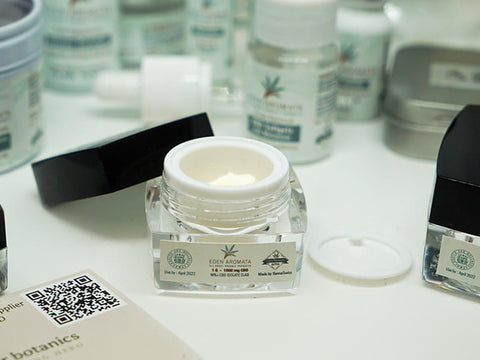What is the Age Restriction on CBD?
Understanding the age restrictions associated with CBD products is crucial for both consumers and vendors. As CBD increases in popularity for its potential health benefits, it’s important to stay informed about the legal stipulations surrounding its purchase and use. In this blog, we will delve into the specific age requirements mandated by various states and countries and discuss how these regulations align with the potential benefits and risks of CBD use among different age groups. Whether you're a first-time buyer or looking to educate yourself further, this guide will provide the essential information you need to navigate the world of CBD safely and legally.

Legal Age Requirements for CBD Purchase and Use
In the United Kingdom, the legal age to buy CBD products is set at 18. The UK allows the sale of CBD products as long as they are derived from industrial hemp containing less than 0.2% THC (tetrahydrocannabinol), the psychoactive compound found in cannabis. This regulation ensures that CBD products are non-psychoactive and safe for consumption.
Retailers in the UK are required to verify the age of buyers to ensure compliance with this legal requirement. Additionally, CBD products must meet specific standards for safety, quality, and labeling set by the Food Standards Agency (FSA) to be legally sold.
It is essential for prospective buyers and users in the UK to check local regulations and ensure that the products they purchase comply with all legal requirements.
Implications of Age Restrictions on CBD Products
The age restrictions placed on CBD products are intended to protect young individuals from potential adverse effects during crucial developmental stages. These limitations also help regulate the industry, ensuring that products are sold responsibly and safely. For vendors, adhering to these laws is critical, as non-compliance can result in severe penalties, including fines and loss of licence. For users, purchasing CBD products from accredited sources guarantees that the content is safe and legal, minimising the risk of encountering products with higher than allowed THC levels or contaminants.
Benefits of CBD for Different Age Groups
CBD boasts a varied range of potential health benefits, which can appeal differently across various age groups. Each stage of life presents unique health challenges, and CBD is used by many to manage specific conditions associated with different life phases.

Children and Adolescents
In children and adolescents, CBD is primarily considered for its potential to address severe epilepsy syndromes, such as Dravet syndrome and Lennox-Gastaut syndrome. These conditions do not typically respond well to traditional medication, making CBD a valuable alternative for some. The FDA has approved the use of Epidiolex, a purified form of CBD, for treating these specific conditions in children aged two and older. It is essential to consult healthcare providers before starting any treatment, as CBD is still a compound with considerable debate concerning its use in children due to the ongoing development of the brain during these years.
Adults
For adults, CBD is often sought after for its purported benefits in relieving conditions such as anxiety, depression, and chronic pain. Adults may also use CBD to help with sleep disturbances or inflammatory conditions like arthritis. The anti-inflammatory and pain-relieving properties of CBD make it an appealing option for adults looking to manage these symptoms without the psychoactive effects associated with THC.
Elderly Individuals
Elderly users may find CBD beneficial in dealing with several age-related issues. Research suggests that CBD can help manage pain, improve sleep, and reduce inflammation, all common conditions in older adults. There is also growing interest in CBD's potential to aid in neurodegenerative diseases, which predominantly affect the elderly, such as Alzheimer's disease and Parkinson’s disease. By potentially improving quality of life and decreasing the intensity of symptoms, CBD could be a crucial supplement for ageing individuals.
In conclusion, while CBD is accessible to various age groups, it's important to understand and adhere to local legal restrictions. As research continues to advance, the potential health benefits of CBD across different life stages may become clearer, offering tailored solutions that align with individual health needs.
Risks Associated with CBD Usage Across Age Groups
Understanding the potential risks associated with CBD usage is crucial for making informed decisions, regardless of age. Although CBD is often seen as a benign substance, it can carry risks or adverse effects in specific age groups, which should not be ignored.
Potential Risks for Minors
Minors, typically defined as individuals under the age of 18, may experience different and potentially more severe side effects from CBD due to their developing bodies. Here are some concerns:
-
Brain Development: The brains of young people continue to develop into their mid-20s. CBD usage could potentially affect cognitive development and brain function, though conclusive studies are still needed.
-
Dependency and Substance Use: Early introduction to substances like CBD may increase susceptibility to dependency or the use of other substances later in life.
-
Hormonal Imbalance: CBD may influence hormonal functioning, which is particularly risky for adolescents whose hormonal systems are still maturing.
-
Psychological Effects: There are concerns about the impact of CBD on the mental health of minors, including potential risks of anxiety and mood disorders, though evidence is inconclusive and mixed.
Risks for Adults
Adults may also face certain risks when using CBD, although they typically differ from those faced by younger age groups. Notable risks include:
-
Drug Interactions: CBD can interact with various medications, potentially altering their effectiveness or leading to adverse effects. This is significant for adults who may be on multiple prescriptions for other health issues.
-
Regulatory Oversight: The lack of FDA regulation in the CBD industry can lead to inconsistent quality and potency in products, which can pose health risks.
-
Over-reliance and Mismanagement of Health Issues: Adults might use CBD as a sole treatment for serious health conditions without professional guidance, possibly leading to poor disease management.
-
Side Effects: Common side effects include fatigue, changes in appetite, diarrhoea, and interaction with other drugs, which could have various implications on daily activities and overall health.
Risks for Senior Citizens
For senior citizens, CBD usage carries its own set of potential risks, primarily due to biological changes associated with ageing and the higher likelihood of chronic health conditions:
-
Medication Interaction: Senior adults often take multiple medications, and the interaction of CBD with other drugs can increase the risk of negative side effects or diminished efficacy of treatments.
-
Cognitive Function: There are concerns that CBD could influence cognitive function, which is a critical issue for seniors prone to cognitive decline.
-
Physical Side Effects: Side effects like dizziness or lightheadedness from CBD can lead to falls or other physical injuries in senior adults.
-
Immune Function: As the immune system weakens with age, CBD’s potential effects on immune function need further study to understand long-term impacts.
As CBD continues to gain popularity and more individuals turn to it as a therapeutic aid, understanding the age-specific risks becomes paramount. While CBD offers several benefits, each age group faces unique hazards that must be weighed carefully. Minors should approach CBD with caution due to the potential impacts on brain development and psychological health. Adults need to consider the implications of unregulated products and potential interactions with other medications. Senior citizens, meanwhile, should be wary of CBD’s effects on cognitive functions and medication interactions.
Awareness and education are key in mitigating these risks, coupled with guidance from healthcare professionals. As research evolves, so too will our understanding of how CBD affects different populations across the lifespan. For now, proceed with caution, prioritise certified products, and always consult with a healthcare provider.
Exploring the Future of CBD Age Restrictions
As the popularity and acceptance of CBD continue to grow, it's likely that the regulations surrounding its sale and use will evolve. Governments and regulatory bodies may adjust age restrictions based on new research into CBD's effects and its safety profile. Additionally, the push for standardised regulations across states and even countries might simplify the legal landscape but could also tighten restrictions depending on public health findings and trends.
Efforts to educate both consumers and policymakers about the benefits and risks associated with CBD will play a crucial role in shaping future regulations. If ongoing studies show significant therapeutic benefits with minimal risks, we might see more lenient regulations for minors under medical supervision. Conversely, if long-term risks are identified, age restrictions could become stricter.
In any scenario, staying informed about changes in laws and new scientific findings will be essential for consumers and industry stakeholders alike. Here are key aspects to watch:
- Changes in federal and state laws regarding CBD.
- Results from new and ongoing clinical studies on CBD effects across different age groups.
- Movements in consumer advocacy and their impact on legislation.
The future of CBD regulations, particularly regarding age restrictions, promises to be dynamic as we continue to learn more about this intriguing compound. Making informed decisions based on emerging data will be crucial for safe and effective use.
















